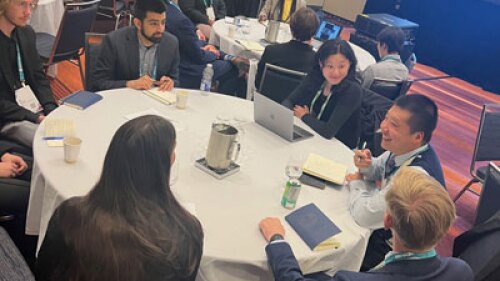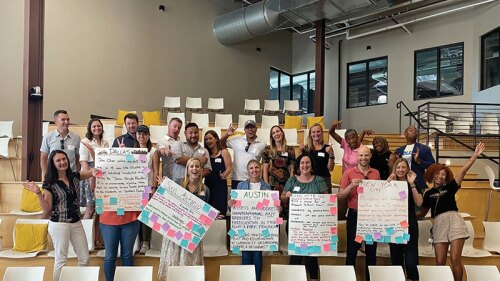Urban Land magazine is accepting nominations until April 21 for the 2016 class of 40 Under 40, a program recognizing outstanding and talented land use professionals under the age of 40 from around the world. In this issue of ULI Connect, we interview Professor Nico Rottke, a member of the 2014 class and an active member of ULI Germany. Formerly of EBS University of Business and Law, Rottke is now a partner in the transaction advisory services group at EY in Germany.
ULI Connect: It looks like you recently made the transition from academia to industry, having established the Real Estate Management Institute (REMI) at the EBS University of Business and Law and now as a partner with EY. Before we discuss your role at EY, describe what you were able to accomplish at EBS.
Nico Rottke: I studied real estate and marketing in the U.S. and Germany, at EBS in Weisbaden and Georgia State University. I went back to Germany to earn a PhD in real estate finance from EBS, and after that I moved into industry to work in private equity, in the high-yield sector. I stayed in that position for two years. At age 28, I was offered a position as an assistant professor in real estate banking at EBS. [With] EBS being a top school internationally, you don’t get an opportunity to be a professor there every day.
At that point in time, they switched the teaching from German to English, and became more international in scope, so it was a great opportunity for me.
My former doctoral adviser had established a Real Estate Management Institute at EBS before I joined the faculty, but then he moved on to a new position. I was given the opportunity to take over REMI through an endowed chairmanship, but I had to sort of rebuild the institute from scratch. I spent much of my time fundraising and procuring capital—similar to what I did in the early phase of my career in private equity, but in an academic/philanthropic context.
“As I said before, real estate is such a multifaceted, multidisciplinary field. No one person is able to understand a building or a city on his or her own. ULI reminds you that you are not alone in your own pond, so to speak.” -Nico Rottke
ULI Connect: When you were charged with rebuilding the Real Estate Management Institute, what were your goals or objectives?
N.R.: Our goal or vision was to be recognized internationally as one of the top ten schools worldwide for real estate research. We wanted to be at the cutting edge in terms of publication, innovative approaches to teaching, and learning. We had an international faculty—experts from the United States, the United Kingdom, and the Czech Republic. In building up a new institute, we had to be creative and entrepreneurial. It was a lot of fun. We built up our master’s of science in real estate program, which continues to attract top students.
ULI Connect: Describe why establishing a master’s program in real estate was a significant benchmark for the institute.
N.R.: Similar to real estate education in the United States, you don’t study real estate during your [studies for your] bachelor’s degree in Germany. We feel students should study as broadly as possible, and only later concentrate on this niche. At EBS, we had a very broad business administration education at the undergraduate level. Five to 10 percent went on to specialize fully in the master’s degree. Specializing at the master’s level was our philosophy at the time.
If you take real estate as a discipline, it’s like you go the bakery. In front of you there are 20 different cakes, and real estate is just one portion of every cake. The real estate discipline is like 20 different portions of 20 different cakes.
As a professor, it is very difficult to teach real estate, because this field is multidisciplinary in nature, not really interdisciplinary in nature. Engineering, fiscal issues, architecture—real estate touches upon all of these fields. I wanted students to get a decision-making perspective. As entrepreneurs, they have to have economic knowledge, legal, and fiscal background. We chose to focus on business-related decision making.
ULI Connect: You spent ten years establishing REMI before returning to industry. What motivated you to make a move back to the private sector?
N.R.: I was really searching for the next professional challenge. Over the ten-year period I was at REMI, I published widely and moved the school significantly in terms of business school rankings. I felt I had achieved a lot, and being 38 at the time, was eager to find out what else was out there. I could have easily stayed at REMI for 25 years and stayed in my comfort zone. But I felt if I was going to make a switch, I had better do it while I was still in my early 40s. After that age, the job market is not as easy to break into.
I asked myself, “If you want to be really outstanding, what are your strengths?” There are two areas in which I think I’m really good: real estate finance and capital procurement. So, I knew my next position would be in funding and finance.
ULI Connect: That takes us to your present position as a partner with the transaction advisory services group within EY. Describe your role and responsibilities.
N.R.: In my position in transaction advisory services within the German real estate group, I ensure that if we are approached with interesting transactions and something is missing within the refinancing structure of the investment, my team and I analyze the project, consult with the client, go to the market of capital partners, and identify the right capital sources for the project at hand. Our focus in on Germany, the U.S., and the U.K.
What I really like about this position [is that] I was asked to build up an area of expertise and a team of specialists from scratch since this special niche within EY Germany didn’t exist before. In doing our job, we bring a level of transparency to our work in figuring out what conditions and structures are like for over 800 sources of capital in Europe for projects in Germany.
Every deal is individual and highly complex. It needs expert knowledge, but also creativity. The large EY platform with highly educated specialists in many different fields can be consulted to make a complex deal work in the end.
So, there is a lot of independence, judgment, and discretion involved. If my team and I think a particular transaction or deal is worth taking a look at, then it might be the case where others have given up too early. It can be a frustrating and painstaking process. It’s not always fun, but it is usually rewarding.
ULI Connect: From your perspective, what can you say about the state of capital markets in Europe right now? What are the markets that investors should be aware of in terms of opportunities, but also risks?
N.R.: Real estate investment in Europe still feels more like a local, regional, or national business, but to some extent, it is becoming more European. Although we are moving towards a more uniform system, we are light-years away from the market really functioning as one market. Markets across Europe are at different stages in the cycle. Regarding commercial real estate transactions in Germany, we have had one of the best years we’ve had. Although many international investors had been coming to Germany, people have a feeling that this will not continue at the same level. It will continue, but not as intensively.
But as the saying goes, “It’s not over until the fat lady sings.” There could be some overheating in the market. Mario Draghi put so much liquidity into Europe; those markets are really at the top, positive outlook, but everybody fears interest rate hikes.
In terms of asset classes, we are seeing some interesting new trends in atypical asset classes. In a survey EY recently completed of German banks and investors financing German real estate, it can be observed that more and more asset classes that would have been considered niche products only a few years ago—like student housing, senior residences, or nursing homes—nowadays are being seen as mainstream. With these products, investors anticipate higher returns and wider risk diversification. Furthermore, multifamily properties owned by listed corporations are being seen as a safe bet, and their location is not playing the most crucial role.
Another asset class that is attracting greater capital is hotel, which typically investors have been leery of in previous years due to its dependence on location and economic cycle. Energy real estate is another asset class that is sparking greater interest.
ULI Connect: Can you talk a bit about your involvement in ULI? When did you first join the Institute and how have you continued to stay involved?
N.R.: I first joined ULI Germany in 2005, first as chair of the Young Leaders Group, a role I held for five years. Then, I became vice chair for research, and joined the ULI Germany advisory board in 2014.
Ten years ago, ULI was being set up in Germany, and it was interesting for me to be part of building up the whole organization in the German context. I didn’t necessarily join ULI for the networking for my career per se, but rather to share knowledge with other industry leaders, people who move our industry forward, and to get to know them really well. I couldn’t have achieved this without ULI.
Engaging with people at the C-suite level offers a unique, one-of-a-kind opportunity. If you engage in ULI, this is what you can achieve. Getting to know professionals who offer a very different perspective on cities than I do with real estate finance is very enriching—planners, for example. These are the kinds of mind-broadening relationships and questions you don’t normally get to pursue in the course of your own job or workday. As I said before, real estate is such a multifaceted, multidisciplinary field. No one person is able to understand a building or a city on his or her own. ULI reminds you that you are not alone in your own pond, so to speak.
Is there an outstanding land use professional within your network who deserves recognition? Nominate him or her to be part of the Urban Land 40 Under 40 class of 2016. The submission deadline is April 21, and the class will be announced at the ULI 2016 Fall Meeting. Go to 40under40.uli.org to nominate.




